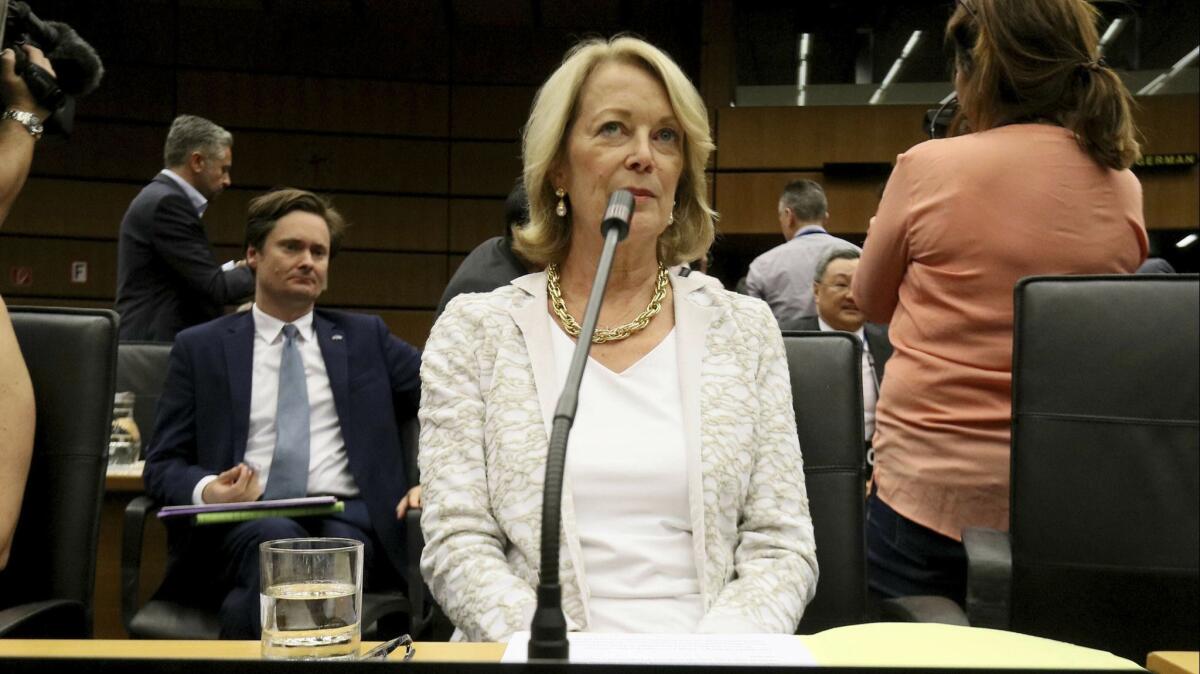U.S. urges world powers to reject Iran’s ‘nuclear extortion’

- Share via
Reporting from VIENNA — The United States admonished world powers seeking to preserve a deal with Iran on its atomic program on Wednesday not to give in to “nuclear extortion” from Tehran. Iran has breached limitations of the nuclear pact in recent days in an attempt to pressure leaders to provide economic benefits that would offset American sanctions.
The U.S. requested the special board meeting of the International Atomic Energy Agency after Iran announced last week it had exceeded the amount of low-enriched uranium it was allowed to stockpile under limitations set in the 2015 nuclear deal. Since then, it also announced it had started enriching uranium past the 3.67% purity allowed, to 4.5%, and IAEA inspectors verified both developments.
By doing so, Tehran hopes to increase the pressure on the remaining members of the nuclear deal, known as the Joint Comprehensive Plan of Action, or JCPOA, to provide economic relief from American sanctions. It has set an early-September deadline until it pushes limits further.
Jackie Wolcott, the U.S. ambassador to international organizations in Vienna, told Iran and others in the room that Washington was open to “negotiation without preconditions” on a new nuclear deal, and that “the only path to sanctions relief is through such negotiations, not nuclear extortion.”
“We are committed to denying Iran the benefits it seeks from these most recent provocations,” she said. “It is imperative that this misbehavior not be rewarded, for if it is, Iran’s demands and provocations will only escalate.”
President Trump underscored the comments later, tweeting that the nuclear deal was “terrible” and threatening that “sanctions will soon be increased, substantially!” Trump has long rejected the deal, saying it was too generous to Tehran and did not address its involvement in regional conflicts.
Russian delegate Mikhail Ulyanov fired back at the meeting that the U.S. could not both reject the deal and call for Iran’s full implementation of it.
“Although for some reason they only refer to Tehran, in fact the United States, who are refusing to fulfill its own obligations under the nuclear deal, lost any right to demand this from others,” he said.
Iran’s representative, Kazem Gharib Abadi, stressed that Iran’s nuclear program was for “peaceful purposes” and said his country was prepared to resume full implementation of the multinational agreement, “commensurate with the implementation of the commitments by all participants.”
At the same time, he decried the U.S. decision to withdraw from the deal and reinstate sanctions, saying it was “neither legitimate nor legal” and should not be accepted by the international community.
“Due to costly and predictable consequences of sanctions, they should be seen as weapons of warfare and means of aggression,” he said. “Economic sanctions are, in fact, collective punishment of the ordinary people, contrary to the objectives and purposes of human rights, and should be considered as crimes against humanity.”
He later told reporters that if the U.S. was serious about wanting to negotiate with Iran, it should drop all sanctions.
“No country is ready to negotiate with a country that is putting a gun at its chest,” he said. He added, however, that the nuclear deal itself was “not renegotiable.”
More to Read
Sign up for Essential California
The most important California stories and recommendations in your inbox every morning.
You may occasionally receive promotional content from the Los Angeles Times.










